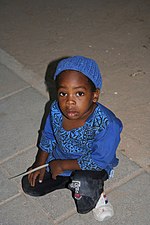Racism against Arabs on the part of the Israeli state and some Israeli Jews has been identified by critics in personal attitudes, the media, education, immigration rights, housing segregation, and social life. Nearly all such characterizations have been denied by the state of Israel. The Or Commission, set up to explain the October 2000 unrest in many Israeli Arab communities found,
"The state and generations of its government failed in a lack of comprehensive and deep handling of the serious problems created by the existence of a large Arab minority inside the Jewish state. Government handling of the Arab sector has been primarily neglectful and discriminatory. The establishment did not show sufficient sensitivity to the needs of the Arab population, and did not take enough action in order to allocate state resources in an equal manner. The state did not do enough or try hard enough to create equality for its Arab citizens or to uproot discriminatory or unjust phenomenon."[5]
According to the 2004
U.S. State Department Country Reports on Human Rights Practices for Israel and the Occupied Territories, the Israeli government had done
"little to reduce institutional, legal, and societal discrimination against the country's Arab citizens."[6] The 2005 US Department of State report on Israel wrote: "[T]he government generally respected the human rights of its citizens; however, there were problems in some areas, including... institutional, legal, and societal discrimination against the country’s Arab citizens."[7] The 2010 U.S. State Department Country Report stated that
Israeli law prohibits discrimination on the basis of race, and that government effectively enforced these prohibitions.[8] Former Likud MK and Minister of Defense Moshe Arens has criticized the treatment of minorities in Israel, saying that they did not bear the full obligation of Israeli citizenship, nor were they extended the full privileges of citizenship.[9]
Israel is a state-party to the Convention on the Elimination of All Forms of Racial Discrimination. According to the 1998 Report of the UN Committee on the Elimination of Racial Discrimination found that the Convention "is far from fully implemented in Israel and the Occupied Palestinian Territory, and that the shortfall contributes very significantly to the dangerous escalation of tension in the region.". The report positively noted the measures taken by Israel to prohibit the activities of racist political parties, the amendment of the Equal Opportunity in Employment Law, prohibiting discrimination in the labour sphere on the grounds of national ethnic origin, country of origin, beliefs, political views, political party, affiliation or age, and the Israeli efforts to reduce and eventually eradicate the economic and educational gap between the Jewish majority and the Arab minority.[10]
Polls
The Association for Civil Rights in Israel (ACRI) published reports documenting racism in Israel, and the 2007 report suggested that anti-Arab racism in the country was increasing. One analysis of the report summarized it thus: "Over two-thirds Israeli teens believe Arabs to be less intelligent, uncultured and violent. Over a third of Israeli teens fear Arabs all together....The report becomes even grimmer, citing the ACRI's racism poll, taken in March 2007, in which
50% of Israelis taking part said they would not live in the same building as Arabs, will not befriend, or let their children befriend Arabs and would not let Arabs into their homes."[11] The 2008 report from ACRI says the trend of increasing racism is continuing.[12] An Israeli minister charged the poll as biased and not credible.[13] The Israeli government spokesman responded that the Israeli government was "committed to fighting racism whenever it raises it ugly head and is committed to full equality to all Israeli citizens, irrespective of ethnicity, creed or background, as defined by our declaration of independence".[13]
Isi Leibler of the Jerusalem Center for Public affairs argues that Israeli Jews are troubled by "increasingly hostile, even treasonable outbursts by Israeli Arabs against the state" while it is at war with neighboring countries,[14]
Another 2007 report, by the Center Against Racism, also found hostility against Arabs was on the rise. Among its findings it reported that
75% of Israeli Jews don't approve of Arabs and Jews sharing apartment buildings; that over half of Jews wouldn't want to have an Arab boss and that marrying an Arab amounts to "national treason"; and that 55% of the sample thought Arabs should be kept separate from Jews in entertainment sites. Half wanted the Israeli government to encourage Israeli Arabs to emigrate. About 40% believed Arab citizens should have their voting rights removed.[15]
A March 2010 poll by Tel Aviv University found that
49.5% of Israeli Jewish high school students believe Israeli Arabs should not be entitled to the same rights as Jews in Israel. 56% believe Arabs should not be eligible to the Knesset, the Israeli parliament.[16]
An October 2010 poll by the Dahaf polling agency found that
36% of Israeli Jews favor eliminating voting rights for non-Jews.[17] In recent polling (2003–2009) between 42% and 56% of Israelis agreed that "Israeli Arabs suffer from discrimination as opposed to Jewish citizens;" 80% of Israeli Arabs agreed with that statement in 2009.[18]





